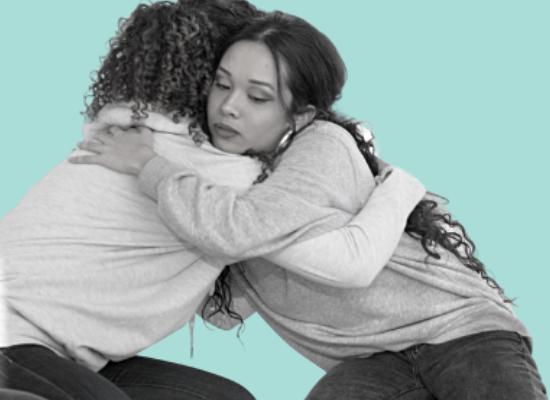
Stephanie Hepburn is a writer in New Orleans. She is the editor in chief of #CrisisTalk. You can reach her at .
“Like many parents, I used the tools I had,” says Gerri Hobdy. Her son, Daniel, is a veteran who was struggling with post-traumatic stress disorder when the pandemic hit. His symptoms worsened. “I felt more terror, existential dread, and pressure sitting in that beige room than as a soldier,” Daniel told #CrisisTalk in July. “There was no enemy to fight—it was just myself, isolation, fear, guilt, and doubt.”
Gerri was better situated than most to know the mental health and substance use community resources available in Baton Rouge. She’d worked in philanthropy for decades. “I led the philanthropic response in our community to address behavioral health challenges resulting from Hurricane Katrina,” she says. That included working with the National Center for PTSD. “Theoretically, I understood what my son was experiencing, but the mother’s heart always makes it difficult, especially to keep boundaries.”
She watched Daniel navigate a cycle of crisis and sobriety, going to great lengths to rescue him from the depths of despair. “I got courageous to the point that I was doing things that weren’t necessarily safe,” laughs Gerri, “like going to a bar in a seedy part of town and cursing out the bartender.” She made the bartender draw a map showing where Daniel was located.
With the help of a strong support system, Gerri took steps to better care for herself and support Daniel differently. “Operating in that energy was unhealthy,” she says. Her close friend, trauma expert Tonja Myles, helped Gerri shift her focus away from directly supporting Daniel’s recovery to focusing on “recovery for all people.”
A turning point in their relationship was when Gerri dropped Daniel off at the Bridge Center for Hope in Baton Rouge, a behavioral health crisis stabilization center. He was experiencing methamphetamine-induced psychosis. She says she “gave it to God.” “I had learned that it was his journey, and he would only get better if he decided he wanted to get better.” Daniel was hurt and angry at the time but later told us, “It was the best thing she could have done for me.” Today, Daniel is a peer support specialist at a treatment facility in Baton Rouge; he’s also a part of a local outreach program.
Gerri has served on the boards of mental health providers, including the Capital Area Human Services District in Baton Rouge. She’s also frequently participated in Crisis Intervention Team (CIT) training, sharing her perspective as a family member of a person with behavioral health challenges. “Sharing lived experiences helps humanize people struggling with addiction,” she says. “It helps law enforcement understand the challenges families face and how best to communicate with families when they go out on a call.” Over the years, she’s forged close friendships with some of the officers who participated in the training.
However, Gerri is candid that people with lived experience need to know when to recharge and when sharing their story begins to take a toll. “I did it too emotionally,” she says. The time it would take her to recover after presenting became longer and longer. “It took me 30 minutes, then a day, and then the sadness began to linger, taking me into a bit of depression.”
She often found herself in an ongoing battle, advocating for her son, whether arguing with attorneys or trying to find providers. Navigating life with Daniel, she quickly identified gaps in the systems he found himself tumbling down, including mental health and the criminal legal system. Along the way, Gerri learned the vital role peers play and about short-term crisis stabilization. She also began meeting with judges to discuss diversion programs. “My advocacy wasn’t just about Daniel,” she points out, “I also did it for the mothers who couldn’t be there, like the single parent working three jobs. I felt that responsibility.”
Gerri notes that family members of people with substance use disorders often stop caring for themselves. “If we’re going to live and do all we need to do, we need to care for ourselves too.”
What helped Gerri when she felt her lowest was friendship, women who’d had similar experiences and were fountains of compassion and love. When she was in the depths of despair, some of her friends came to her house and took her to a hotel. “These are very busy women,” she says. “They brought their kids, bought them pizza, and put them in one room while they prayed over me all night in the other.”
She says support for people in crisis and their families should be accessible, and, at the time, she didn’t know of any formal family peer support services in Baton Rouge. “Had it been available, I would have certainly participated.”
In February, Ebony Chambers, Chief Family and Youth Partnership Officer at Stanford Sierra Youth and Families, told #CrisisTalk that she doesn’t know what she would’ve done without parent peer support. “They got me.” She shared that navigating the crisis experience “is not watercooler talk.” “If a colleague asked about my weekend, I wouldn’t say, ‘Oh, I worried all weekend about my daughter’s suicidal ideation.’” Because of her own experience, Chambers launched family peer support at SSYF, which has 40 parent peers across Northern California.
People can also access SSYF’s parent-to-parent support virtually through Zoom. Additionally, NAMI has family peer-led support groups, run by its local affiliates.
In the midst of turmoil, Gerri notes many people also might not recognize the layers of informal support they have. When she was going through a divorce, a friend encouraged her to identify and reach out to her existing networks. “He’s a minister, and when I met with him, he had a triage support team in his office, made up of my friends.” “I was like, I thought I was just coming to talk to you,” she laughs. These connections, says Gerri, are like wearing a life preserver while navigating choppy waters.
However, she points out that there’s not only the issue of insufficient resources and support for families and people struggling with mental health and substance use challenges but also that stigma has scaffolded a massive barrier to care. “Many people are ashamed to ask for help,” says Gerri, and want to shield their loved ones from judgment. “We feel like failures. If I need help, does that mean I’ve failed as a mother?”
Over the years, Gerri has continued to support mothers whose children are struggling with mental health and substance use challenges. “There were days where I thought, ‘Should I be here?’” “I wanted the pain to go away for me too, but, for a mother, watching a child’s pain and suffering is worse than our own.” Family peer support, she says, helps teach family members how best to “show up” for a loved one in recovery.
“When Daniel had access to the resources and supports he needed, he finally had the opportunity to be independent,” she says. “He makes choices for his own healing because he knows, better than anyone else, what’s going to work for him.”









